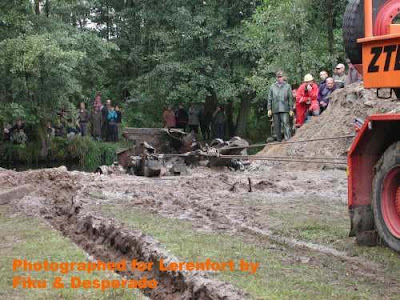Recuperación de un Panther en Polonia
Hasta septiembre de 2003 los habitantes cerca del río Czarna Nida (Polonia) podían ver un PzKpfw V Panther hundido en él. El vehículo había pertenecido a la 17º Panzerdivision y se perdió durante el cruce del río en 1945. El 3 de septiembre de 2003 comenzaron los trabajos de recuperación del carro de combate. El equipo de buceo del Museo del Águila Blanca en Skarzysko - Kamienna, (una ciudad a unos 100 kilómetros al sur de Varsovia) fue el encargado de inspeccionar los restos del Panther antes de colocar los cables para su recuperación. Los sedimentos fueron retirados con una manguera a presión eliminándolos del interior del casco. Antes de las 10 de la mañana ya se había congregado gran cantidad de público para ver el rescate.
A pesar de la preparación el vehículo estaba reacio a salir del fondo del río. Un camión comenzó a arrastrar al Panther hacia la orilla pero los cables de acero provocaron una rotura en el carro sin lograr sacarlo entero. El accidente arrancó un trozo del casco del Panther llevándolo hasta la orilla. El trozo que emergió mostraba daños evidentes de un incendio y explosión aunque no se sabe si fue durante la guerra o por la destrucción posterior de las fuerzas armadas de Polonia después de la guerra.
Al finalizar el primer día de trabajo el equipo tuvo que replantearse la estrategia para recuperar el vehículo. El jueves día 4 el vehículo fue de nuevo enganchado y remolcado hacia la orilla bajo la atenta mirada de una gran multitud. Al sacar los restos a la superficie pudieron comprobar la gran cantidad de sedimentos que había en su interior, motivo por el cual se rompieron dos de los cables de acero.
Actualmente los restos del Panther están expuestos en el Museo del Águila Blanca pero hay muy poco que ver del carro. El panel trasero está separado del resto y amontonado en su interior.
English version
Until September 2003 the inhabitants near the river Czarna Nida (Poland) could see a PzKpfw V Panther sunk into it. The car had belonged to the 17 th Panzer division and was lost during the crossing of the river in 1945. On September 3, 2003 work began on the recovery tank. The diving team of the White Eagle Museum in Skarzysko - Kamienna, (a town about 100 kilometers south of Warsaw) was commissioned to inspect the remains of the Panther before placing the cables for recovery. The sediments were removed with a water hose inside the hull eliminating them. Before 10 am and had large crowds gathered to watch the rescue.
While preparing the vehicle was reluctant to leave the river bottom. A truck began to drag the Panther to the shore but the steel cables caused a break in the car without being able to remove it entirely. The accident tore a piece of the hull of Panther taking him to shore. The piece that emerged showed obvious damage from a fire and explosion although it is unclear whether it was during the war or the subsequent destruction of the armed forces of Poland after the war.
After the first day of work the team had to rethink the strategy for recovering the vehicle. On Thursday 4 the vehicle was hooked and towed back to shore under the watchful gaze of a large crowd. By removing the remains to the surface were able to see the large amount of sediment that was inside, which is why they broke two steel cables.
Today the remains of the Panther are exposed at the Museum of the White Eagle, but there is little to see the car. The rear panel is separate and stacked inside.








No hay comentarios:
Publicar un comentario